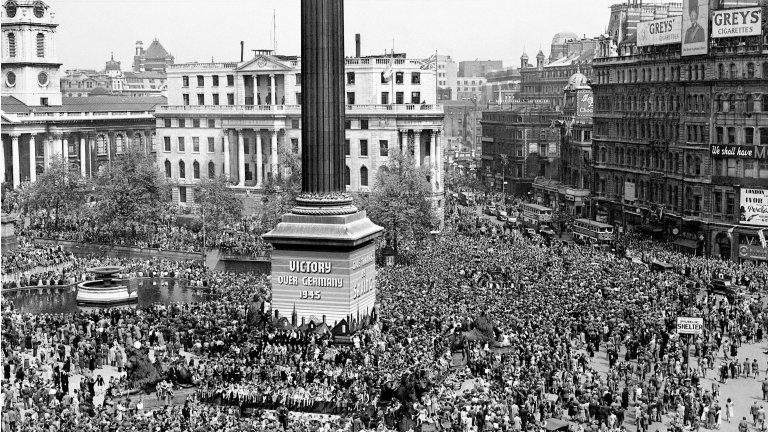How Victory in Europe Day was celebrated across Wales
- Published
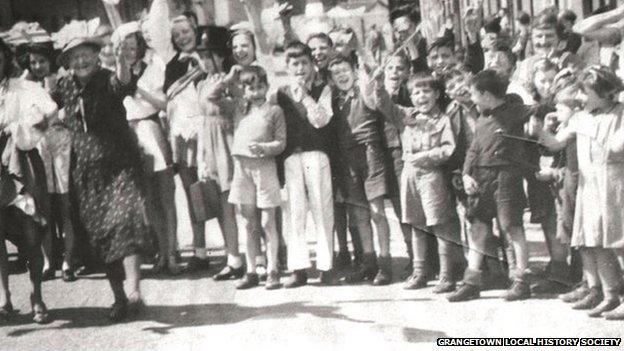
Street parties were held across Wales like this one in Ludlow Street in Grangetown, Cardiff
Victory in Europe Day celebrations will take place across Wales this weekend after months of planning, but 70 years ago it was a very different story.
Caught somewhat on the hop by Winston Churchill's announcement that the war in Europe was over - and limited by wartime rationing - those first VE Day celebrations were more spontaneous affairs.
Bunting and flags were improvised from the now-redundant blackout curtains, while eggless cakes and powdered milk blancmanges were all that could be rustled-up at such short notice.
But as Rita Spinola recalls, the shortages and lack of planning couldn't dampen the enthusiasm at the party held on her street in Grangetown, Cardiff.
'Sense of relief'
"I was only six at the time, and the main thing which sticks with me is the noise. The evenings were quiet during the war, so it was the first time in my life that I'd heard so many people out having fun.
"People brought whatever they had; guitars, mouth organs. Somebody even rolled a piano down the steps and out onto the street I recall.
"There were barrels of beer from the pub, and someone had made a Union Jack from their blackout curtains. We didn't have a lot, but there was such a sense of relief and joy that we didn't need a lot."
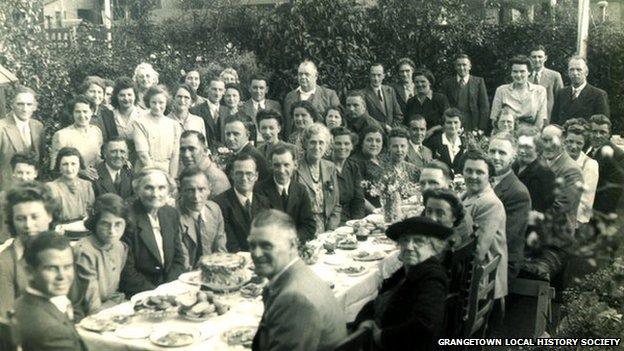
A welcome home party took place in Avondale Crescent, Grangetown, for a prisoner-of-war
In Swansea, Dot and Les Prior had even more reason to celebrate as the announcement came days before both of their 20th birthdays.
Les remembers taking part in a spontaneous parade of the Home Guard through the bombed-out streets.
"I was sent home early, at about lunchtime, from work at the bakery. The boys in the Home Guard all met up at the hall on Town Hill and we didn't know what to do with ourselves.
"We'd patrolled Swansea Bay every night of the war, and now suddenly there was no war.
"So we decided to march in our uniforms down into town. A few people came out to watch us on Town Hill, but by the time we'd made it into the centre there were thousands lining the road and cheering.
"It seemed somehow fitting to be parading through the rubble of Swansea after the Blitz; we'd been knocked down but we hadn't been beaten."
'Lined the roads cheering'
Dot also remembers the size of the crowds, but for her it was the end of the blackout which she remembers most vividly.
"I'd never seen so many people in the same place. Everyone just wandering around in a shocked daze, with goofy grins all over their faces.
"By the evening everyone was popping in and out of each other's houses, sharing whatever they had; you found yourself sitting on a strange sofa, having a chat with people you'd never set eyes on before and never did again after that night.
"But the thing I remember most of all is the amount of light. It was a warm night, everyone had their windows and doors open, and all this marvellous light was spilling out onto the street.
"It was such a difference after all those depressing dark nights of the blackout and the best birthday present I could have wished for."
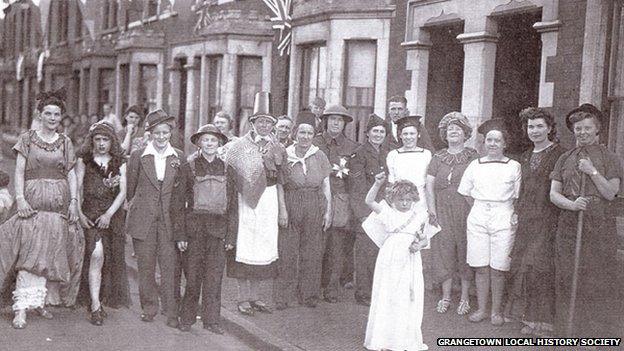
Residents on Monmouth Street in Grangetown, Cardiff, celebrated outside their homes
But not everyone was fortunate enough to take part in the parties.
Ninety-two-year-old Ted Evans, from Ruthin, was a merchant seaman aboard a ship on the River Seine, delivering oil to US troops in Rouen, when the announcement came over the radio.
"The thing I remember the most is the sense of injustice that we weren't allowed to go ashore to join in the celebrations. We could hear singing and dancing going on all around us, and we were in this little bubble, cut off from the outside world.
"But someone had managed to smuggle some gin aboard. We drunk so much of it that I still can't stand the stuff to this day, so it wasn't all bad.
"By the time we docked back in Stepney a few days later, everything was back to normal. With rationing, the hardship of life and the insecurity of what came next, nobody felt much like partying anymore.
"Of course it was even worse for the troops stationed abroad, so that's all the more reason for those of us who can to make the most of it this time around and find out what we missed out on all those years before."
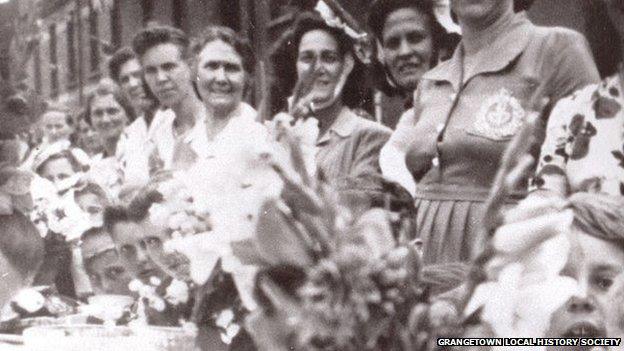
People spilled on to the streets like they did in Hewell Street in Grangetown, Cardiff
- Published4 May 2015
